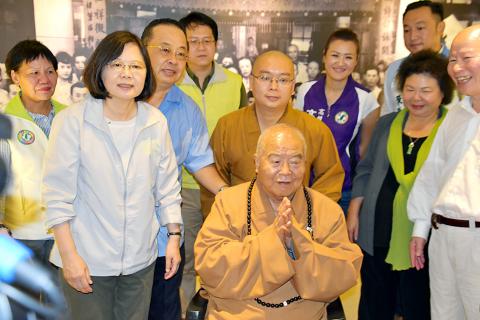Democratic Progressive Party (DPP) presidential candidate Tsai Ing-wen (蔡英文) yesterday said that she regrets the “gap” between reality and a media report on a US academic’s remarks about the so-called “1992 consensus,” urging the media to be more cautious when publishing reports.
When attending an Atlantic Council meeting last week on next year’s presidential election, Bonnie Glaser, a senior adviser for Asia at the Center for Strategic and International Studies, said that, during a scheduled meeting between Chinese President Xi Jinping (習近平) and US President Barack Obama in Washington next month, one of the messages that Xi would convey to Obama might be that in order to have cross-strait stability, there must be an acceptance by Taiwan’s next president of the “1992 consensus” and of the concept of “one China.”
However, the Chinese-language United Daily News published a report on Glaser’s remarks in a story with the headline quoting Glaser as saying: “Taiwan’s next president must accept the ‘1992 consensus.’”

Photo: Su Fu-nan, Taipei Times
“There is a gap between the report and reality,” Tsai said. “I think [the media] should be cautious when interpreting statements by any foreign academics or experts, including Glaser, because it is not only to show respect to them, but also important for readers.”
“I regret what happened, which is not the first time, and I hope the media would be careful when writing reports,” she added.
Tsai made the remarks when attending the opening of a special exhibition to mark the birthday of the late democracy pioneer Yu Chen Yueh-ying (余陳月瑛), who passed away last year at her residence in Kaohsiung’s Ciaotou District (橋頭), which has been turned into a museum to commemorate her.
Also in attendance were local politicians and public figures, including Kaohsiung Mayor Chen Chu (陳菊), former DPP chairperson Hsu Hsin-liang (許信良) and DPP lawmakers as well as Buddhist master Hsing Yun (星雲).
Tsai praised Yu Chen for her contribution to Taiwan’s democratization, and vowed to continue to deepen democratic values if elected president.
Hsing, who is often considered to be pro-Chinese Nationalist Party (KMT), spoke with Tsai and called her “Taiwan’s Goddess Matsu,” saying that Tsai would definitely be elected president.

ANOTHER EMERGES: The CWA yesterday said this year’s fourth storm of the typhoon season had formed in the South China Sea, but was not expected to affect Taiwan Tropical Storm Gaemi has intensified slightly as it heads toward Taiwan, where it is expected to affect the country in the coming days, the Central Weather Administration (CWA) said yesterday. As of 8am yesterday, the 120km-radius storm was 800km southeast of Oluanpi (鵝鑾鼻), Taiwan’s southernmost tip, moving at 9kph northwest, the agency said. A sea warning for Gaemi could be issued tonight at the earliest, it said, adding that the storm is projected to be closest to Taiwan on Wednesday or Thursday. Gaemi’s potential effect on Taiwan remains unclear, as that would depend on its direction, radius and intensity, forecasters said. Former Weather Forecast

As COVID-19 cases in Japan have been increasing for 10 consecutive weeks, people should get vaccinated before visiting the nation, the Centers for Disease Control (CDC) said. The centers reported 773 hospitalizations and 124 deaths related to COVID-19 in Taiwan last week. CDC Epidemic Intelligence Center Director Guo Hung-wei (郭宏偉) on Tuesday said the number of weekly COVID-19 cases reported in Japan has been increasing since mid-May and surpassed 55,000 cases from July 8 to July 14. The average number of COVID-19 patients at Japan’s healthcare facilities that week was also 1.39 times that of the week before and KP.3 is the dominant

The Chinese Communist Party’s (CCP) working group for Taiwan-related policies is likely to be upgraded to a committee-level body, a report commissioned by the Mainland Affairs Council (MAC) said. As Chinese President Xi Jinping (習近平) is increasingly likely to upgrade the CCP’s Central Leading Group for Taiwan Affairs, Taiwanese authorities should prepare by researching Xi and the CCP, the report said. At the third plenary session of the 20th Central Committee of the CCP, which ended on Thursday last week, the party set a target of 2029 for the completion of some tasks, meaning that Xi is likely preparing to

US-CHINA TRADE DISPUTE: Despite Beijing’s offer of preferential treatment, the lure of China has dimmed as Taiwanese and international investors move out Japan and the US have become the favored destinations for Taiwanese graduates as China’s attraction has waned over the years, the Ministry of Labor said. According to the ministry’s latest income and employment advisory published this month, 3,215 Taiwanese university graduates from the class of 2020 went to Japan, surpassing for the first time the 2,881 graduates who went to China. A total of 2,300 graduates from the class of 2021 went to the US, compared with the 2,262 who went to China, the document showed. The trend continued for the class of 2023, of whom 1,460 went to Japan, 1,334 went to